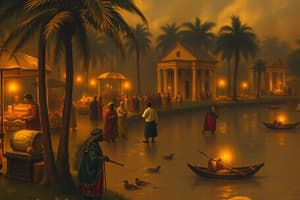Podcast
Questions and Answers
Which factor contributed significantly to the Ghana Empire's military strength?
Which factor contributed significantly to the Ghana Empire's military strength?
- Naval dominance along the West African coast.
- Strategic alliances with European kingdoms.
- Iron smelting for powerful weapon production. (correct)
- Adoption of gunpowder technology from East Asia.
What role did Koumbi Saleh play in the Ghana Empire?
What role did Koumbi Saleh play in the Ghana Empire?
- It was a military outpost protecting the empire's borders.
- It served as the empire's primary agricultural center.
- It functioned as the political and economic capital. (correct)
- It was the main religious site for traditional beliefs.
Which of the following best describes the Ghana Empire's approach to trade within its borders?
Which of the following best describes the Ghana Empire's approach to trade within its borders?
- They imposed taxes on traders moving goods through the empire. (correct)
- They prohibited foreign merchants to protect local industries.
- They heavily subsidized trade to encourage economic growth.
- They used a barter system without currency exchange to control trade.
What was the primary reason for the decline and fall of the Ghana Empire?
What was the primary reason for the decline and fall of the Ghana Empire?
How did Islam influence the Ghana Empire?
How did Islam influence the Ghana Empire?
Flashcards
Ghana Empire
Ghana Empire
An empire in West Africa, existing from 830 C.E. to 1235 C.E., known for its gold.
Ghana (Name Meaning)
Ghana (Name Meaning)
Means 'king of gold,' referring to the ruler's wealth and power in the Ghana Empire.
Islam's Influence
Islam's Influence
A major religion that influenced the culture and administration of the Ghana Empire.
Koumbi Saleh
Koumbi Saleh
Signup and view all the flashcards
Fall of Ghana Empire
Fall of Ghana Empire
Signup and view all the flashcards
Study Notes
- The Ghana Empire, also known as the Kingdom of Ghana, existed in West Africa from 830 C.E. to 1235 C.E.
- "King of Gold" is the meaning of the empire's name.
- Wagadou and Awkar are alternative names for the empire.
- The Kingdom of Ghana controlled a large part of Western Sudan (West Africa).
- Islam significantly influenced the empire's culture and administration.
- Koumbi Saleh served as the empire's capital.
- Trade was essential to the Ghana Empire's success and long life.
- Koumbi Saleh was the most important trading city, holding the majority of the empire's riches.
- Trade revenues were supplemented by taxes on traders importing and exporting goods.
- Iron smelting for powerful weapons also contributed to the Ghana Empire's success.
- Majan Dyabe Cisse and Diara Kante were Ghana Empire's most influential rulers.
- In 1235 C.E., the Ghana Empire fell and was absorbed into the Mali Empire.
- Arabs from North Africa, led by Abu Bakr, conquered the Ghana Empire.
Studying That Suits You
Use AI to generate personalized quizzes and flashcards to suit your learning preferences.
Description
Explore the Ghana Empire, a West African kingdom from 830 C.E. to 1235 C.E. Discover its trade-based economy, cultural impact of Islam, and eventual absorption into the Mali Empire. Learn about its key figures and the significance of Koumbi Saleh.




